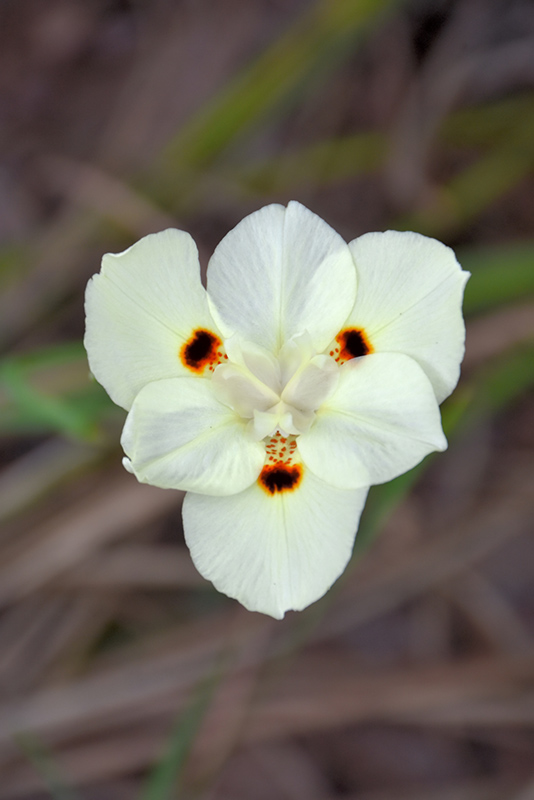Bicolor African Iris
Dietes iridioides 'Bicolor'
Height: 26 inches
Spacing: 14 inches
Sunlight:
![]()
![]()
Hardiness Zone: 8a
Other Names: Fortnight Lily, Morea Iris, Wood Iris, Cape Iris
Description:
Pretty white blooms with contrasting black spots edged in orange; good for bogs or ponds as it requires consistent moisture; quite easy to grow; blooms all season, cut back in the fall to allow plant to regenerate
Ornamental Features
Bicolor African Iris features showy spikes of white orchid-like flowers with orange overtones and black spots rising above the foliage from mid spring to mid fall. The flowers are excellent for cutting. Its attractive sword-like leaves remain dark green in color throughout the year.
Landscape Attributes
Bicolor African Iris is an herbaceous evergreen perennial with tall flower stalks held atop a low mound of foliage. Its medium texture blends into the garden, but can always be balanced by a couple of finer or coarser plants for an effective composition.
This plant will require occasional maintenance and upkeep. Trim off the flower heads after they fade and die to encourage more blooms late into the season. Deer don't particularly care for this plant and will usually leave it alone in favor of tastier treats. It has no significant negative characteristics.
Bicolor African Iris is recommended for the following landscape applications;
- Mass Planting
- General Garden Use
- Container Planting
- Bog Gardens
Planting & Growing
Bicolor African Iris will grow to be about 24 inches tall at maturity, with a spread of 24 inches. When grown in masses or used as a bedding plant, individual plants should be spaced approximately 14 inches apart. The flower stalks can be weak and so it may require staking in exposed sites or excessively rich soils. It grows at a medium rate, and under ideal conditions can be expected to live for approximately 10 years. As an evegreen perennial, this plant will typically keep its form and foliage year-round.
This plant does best in full sun to partial shade. It prefers to grow in moist to wet soil, and will even tolerate some standing water. It may require supplemental watering during periods of drought or extended heat. It is not particular as to soil type or pH. It is somewhat tolerant of urban pollution. This is a selected variety of a species not originally from North America, and parts of it are known to be toxic to humans and animals, so care should be exercised in planting it around children and pets. It can be propagated by division; however, as a cultivated variety, be aware that it may be subject to certain restrictions or prohibitions on propagation.
Bicolor African Iris is a fine choice for the garden, but it is also a good selection for planting in outdoor pots and containers. With its upright habit of growth, it is best suited for use as a 'thriller' in the 'spiller-thriller-filler' container combination; plant it near the center of the pot, surrounded by smaller plants and those that spill over the edges. It is even sizeable enough that it can be grown alone in a suitable container. Note that when growing plants in outdoor containers and baskets, they may require more frequent waterings than they would in the yard or garden.
Disclaimer - This Plant Finder tool is an online resource representing many of the varieties that we carry over the course of the season, and is intended for informational purposes only. Inventory varies seasonally, so we cannot guarantee that every plant will be in stock at all times - please contact the store directly for current availability. It does not include our entire selection of plants, so be sure to visit our store to see varieties that may not be represented on this list.

